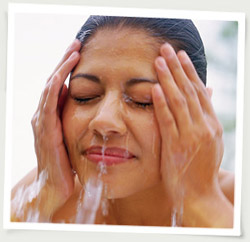
Natural tips for healthier skin
Posted in Health & Wellness on May 21, 2012 by FloridaHealth.com staff. Last modified on December 02, 2018. Read disclaimer.
While no two people have identical skin...
Here are 9 tips to help everyone achieve the most youthful, radiant skin possible:
- Feed your skin with antioxidants
An "inside out" approach helps create the healthiest skin. Antioxidants protect your skin from skin damage, toxic chemicals, pollution and inflammation. All fruits, vegetables, nuts and seeds contain antioxidants. The more antioxidants we eat, the more protection we will have. Other vitamins (along with good food sources) that help skin health include Vitamins:
A - dark greens, carrots, squash, eggs, whole milk
B2, B3, B12 - liver, eggs, bran, peas, lean meats, fortified foods
C - dark greens, citrus fruits, tomatoes, strawberries, cabbage
E - wheat germ oil, fortified cereals, egg yolk, fish, milk, vegetable oils, nuts, fruits
H (Biotin) - liver, egg yolk, cereals, peas, beans, nuts, tomatoes, leafy greens, milk
Fish oils - help reduce free radicals which can damage skin and helps smooth out lines and wrinkles. - Exercise regularly
Exercise (as your physical condition permits) to get your heart beating, lungs working and blood flowing. This not only delivers nutrients and oxygen to the skin but the sweating flushes out impurities. - Encourage cell turnover
Depending on your skin type consider an exfoliant -- a skin care product that is applied to the skin to remove dead cells from the surface. When making your choice, read the label and consult your doctor. - Make a clean sweep
Clean bacteria-bearing brushes at least weekly. If you don't wash your brushes, germs and bacteria can easily be transferred back into skin and into your makeup or skin care products. - Protect yourself from the sun
While a little bit of sun exposure helps your body to produce important Vitamin D, it's equally important to protect skin from sun damage and aging skin. (Excessive or intermittent sun exposure not only increases one's risk of skin cancer and eye damage, it also accelerates the destruction of collagen resulting in thinning, saggy skin.) Some skin care and cosmetic products feature SPF (Sun Protection Factor) right in the formulations. Use broad spectrum UVA/UVB protection in a lightweight formulation to protect against sun damage and premature aging -- and reapply often. But don't rely on sunscreen completely. Also, try to stay indoors or at least under protection of shade during the hottest hours of the day: 10am to 4pm. And cover up with a wide brimmed hat that protects your ears, nose and neck as long as long-sleeved shirt and pants. Also, avoid tanning beds. - Avoid smoking and smokers
Smoke is terribly damaging to skin. Not only does it constrict blood vessels, which prevents oxygen and nutrient-rich blood from reaching the outermost skin layers, smoke also damages collagen and elastin so that a smoker's skin is more likely to sag and wrinkle. - Care for your skin gently
Avoid long, hot showers and harsh soaps which strip oils from the skin. Then, simply pat skin dry so that it remains and lock in the moisture with a moisturizer that is appropriate for your skin type. - Get adequate sleep
For teens, this is at least 9 hours a night. Adults should strive for 7-9 hours. - See a doctor, when appropriate
Acne may be a temporary but embarrassing problem for most teenagers but in severe cases, it can result in permanent scarring. Medical treatment, however, may be able to help. And if you notice changes in moles or unexplained red or itchy patches, see your doctor.
In addition, a skin-healthy balanced diet includes drinking plenty of water and eating whole grains and lean protein sources like beans, fish, eggs, poultry or lean, unprocessed meats.
Avoid foods that are high in unhealthy saturated fats and trans fats, salt and added sugar.
+ Free Shipping & Returns on Eligible Items.
(*Amazon's Top 100 list updated hourly.)
Sources (Accessed May 21, 2012):
https://www.womenshealth.gov/fitness-and-nutrition/nutrition-basics
https://www.mayoclinic.org/healthy-lifestyle/adult-health/in-depth/skin-care/art-20048237?pg=1
http://www.niams.nih.gov/Health_Info/Kids/healthy_skin.asp

 Germiest items in your home | Quiz
Germiest items in your home | Quiz When to wash clothes | Infographic
When to wash clothes | Infographic How to select, ripen and enjoy healthy avocados
How to select, ripen and enjoy healthy avocados Potty training tips for girls and boys
Potty training tips for girls and boys Home & yard mosquito control | Infographic
Home & yard mosquito control | Infographic 9 Beauty secrets to younger-looking skin
9 Beauty secrets to younger-looking skin Dietary needs of adults and older adults
Dietary needs of adults and older adults Can cranberry juice prevent urinary tract infections?
Can cranberry juice prevent urinary tract infections? 9 Foods that are delicious and super nutritious
9 Foods that are delicious and super nutritious What works (and what doesn't) for hangovers
What works (and what doesn't) for hangovers Tips for preventing or treating sunburns
Tips for preventing or treating sunburns Foods that are high in calcium for healthy bones
Foods that are high in calcium for healthy bones Action plan for getting rid of cockroaches
Action plan for getting rid of cockroaches What causes body odor and how to prevent it
What causes body odor and how to prevent it Important tips for preventing heart disease
Important tips for preventing heart disease Ha! Try this funny technique for managing stress
Ha! Try this funny technique for managing stress How to prevent and remove mold and mildew
How to prevent and remove mold and mildew Container gardening ideas
Container gardening ideas What is cholesterol and tips for managing it
What is cholesterol and tips for managing it